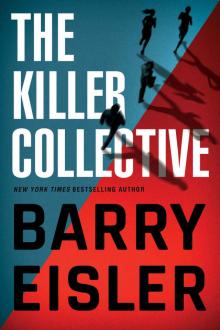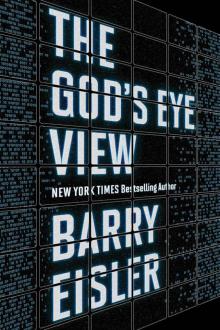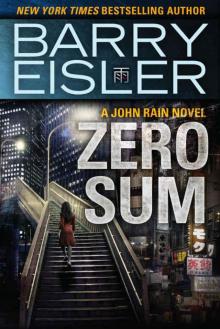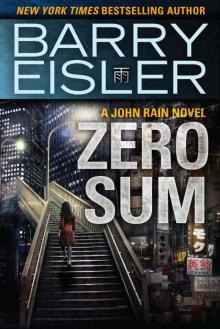- Home
- Barry Eisler
John Rain 07 - The Detachment
John Rain 07 - The Detachment Read online
Copyright © 2011 by Barry Eisler. All rights reserved.
The Detachment is a work of fiction. Certain incidents described in the book are based on actual recent and historical events, but other than well-known public figures referred to by name, all the characters are products of the author’s imagination and are not construed as real, and any resemblance to actual persons living or dead is entirely coincidental. Neither the publisher nor author can be held liable for any third-party material referenced in the book.
No part of this book may be reproduced, or stored in a retrieval system, or transmitted in any form or by any means, electronic, mechanical, photocopying, recording, or otherwise, without express written permission of the publisher.
Published by Thomas & Mercer
P.O. Box 400818
Las Vegas, NV 89140
ISBN: 978-1-61218-944-4
To novelists J.A. Konrath and M.J. Rose,
for seeing the way and blazing the trail.
Behind the ostensible government sits enthroned an invisible government owing no allegiance and acknowledging no responsibility to the people.
—Theodore Roosevelt
We’re entering an era of the educated establishment, in which government acts to create a stable—and often oligarchic—framework for capitalist endeavor.
—David Brooks
My view is that Washington and the regulators are there to serve the banks.
—Chairman of the House Banking Committee Spencer Bachus
All governments lie.
—I.F. Stone
Contents
part one
chapter one
chapter two
chapter three
chapter four
chapter five
chapter six
chapter seven
chapter eight
chapter nine
chapter ten
chapter eleven
chapter twelve
chapter thirteen
part two
chapter fourteen
chapter fifteen
chapter sixteen
chapter seventeen
chapter eighteen
part three
chapter nineteen
chapter twenty
chapter twenty-one
chapter twenty-two
chapter twenty-three
chapter twenty-four
chapter twenty-five
chapter twenty-six
chapter twenty-seven
chapter twenty-eight
chapter twenty-nine
chapter thirty
chapter thirty-one
chapter thirty-two
chapter thirty-three
author’s note
acknowledgments
sources
also by barry eisler
recommended reading
About the Author
…of course, we can always get lucky. Stunning events from outside can providentially awaken the enterprise from its growing torpor, and demonstrate the need for reversal, as the devastating Japanese attack on Pearl Harbor in 1941 so effectively aroused the U.S. from its soothing dreams of permanent neutrality.
—Michael Ledeen
The only chance we have as a country right now is for Osama bin Laden to deploy and detonate a major weapon in the United States.
—Michael Scheurer, former head of the CIA’s Bin Laden Unit
The government in a revolution is the despotism of liberty against tyranny.
—Robespierre
I hadn’t killed anyone in almost four years. But all good things come to an end, eventually.
It was good to be living in Tokyo again. The face of the city had changed, as it continuously does, and the great Touhoku quake and tsunami continued to make their presence known in the form of dimmed lights and weakened summer air conditioning, along with an atmosphere newly balanced between anxiety and determination, but in its eternal, essential energy, Tokyo is immutable. Yes, during my sojourn in safer climes, there had occurred an unfortunate profusion of Starbucks and Dean & Delucas, along with their innumerable imitators, but the havens that mattered remained impervious to this latest infestation. There was still jazz at Body & Soul in Minami Aoyama, where no seat is too far from the stage for a quiet word of thanks to the band members at the end of the evening; coffee at Café de l’Ambre in Ginza, where even as he nears his hundredth birthday, proprietor Sekiguchi-sensei arrives daily to roast his own beans, as he has for the last six decades; a tipple at Campbelltoun Loch in Yurakucho, where, if you can secure one of the eight seats in his hidden basement establishment, owner and bartender Nakamura-san will recommend one of his rare bottlings to help melt away, however briefly, the world you came to him to forget.
My sleep was sometimes restless, though I told myself no one was looking for me anymore. But I knew if they were, they’d start with a place I’d been known to frequent. Unless you had unlimited manpower, you couldn’t use the bars or coffee houses or jazz clubs I liked. There were too many of them in Tokyo, for one thing, and my visits would be too hard to predict. You might wait for months, maybe forever, and though there are harder surveillance duty stations than the oases haunted by Tokyo’s roving night denizens, eventually you’d start to stand out, especially if you were a foreigner. Meanwhile, whoever was paying would be getting impatient for results.
Which made the Kodokan a unique vulnerability. I’d trained there for nearly twenty-five years before powerful enemies forced me to flee the city, enemies I had, by one means or another, managed to outlast. Judo at the Kodokan had been my only indulgence of anything like a routine, a pattern that could be used to fix me in time and place. Going back to it might have been my way of reassuring myself that my enemies really were all dead. Or it could have been a way of saying come out, come out, wherever you are.
Randori, or free training, was held in the daidojo, a modern, two-storied space of four connected competition zones open to bleachers ringing the area a floor above. On any given night, as many as two hundred judoka wearing the traditional white judogi, male and female, Japanese and foreign, buzz-cut college stars and grizzled veterans, take to the training hall, and the vast space is filled with cries of commitment and grunts of defense; earnest discussions of tactics and techniques in mutually incomprehensible tongues; the drum beat of bodies colliding with the tatami and the cymbal slaps of palms offsetting the impact with ukemi landings. I’ve always loved the cacophony of the daidojo. I’ve stood in it when it’s empty, too, and its solemn daytime stillness, its enormous sense of patience and potential, has its own magic, but it’s the sound of evening training that imbues the space with purpose, that brings the dormant hall to life.
On training nights the bleachers are usually empty, though nor is it unusual to see a few people sitting here and there and watching the judoka practicing below: a student, waiting for a friend; a parent, wondering whether to enroll a child; a martial arts enthusiast, making a pilgrimage to the birthplace of modern judo. So I wasn’t unduly concerned one night at the sight of two extra large Caucasians sitting together in the stands, thickly muscled arms crossed over the railing, leaning forward like carrion birds on a telephone line. I logged them the way I reflexively log anything out of place in my environment, giving no sign that I had particularly noticed them or particularly cared, and continued randori with the partner I happened to be training with, a stocky kid with a visiting college team who I hadn’t yet let score against me.
My play had reached a level at which for the most part I was able to anticipate an opponent’s attack in the instant before he launched it, subtly adjust my position accordingly, and frustrate his plan without his knowi
ng exactly why he’d been unable to execute. After a while of this invisible interference, often an opponent would try to force an opening, or muscle a throw, or would otherwise over-commit himself, at which point, depending on my mood, I might throw him. Other times, I was content merely to flow from counter to counter, preventing battles rather than fighting them. A different approach than had characterized my younger days at the Kodokan, when my style had more to do with aggression and bravado than it did with elegance and efficiency. As the offspring of a Japanese father and Caucasian American mother, I once wore a heavy chip on my shoulder. My appearance was always Japanese enough, but appearances have almost nothing to do with prejudice in Japan. In fact, the society’s worst animus is reserved for ethnic Koreans, and burakumin—descendents of leather workers—and those others guilty of hiding their impurities behind seemingly Japanese faces. Of course, my formative years are long behind me now. These days, with my dark hair increasingly shot through with gray, I no longer pine for a country that might welcome me as its own. It took time, but I’ve learned not to engage in those conflicts I’ve always lost before.
From their size, close-cropped hair, and Oakley wraparound shades, favored these days by Special Forces and their private sector counterparts, I made the visitors as military, maybe serving, maybe ex. That in itself was unremarkable: the Kodokan is hardly unknown among the American soldiers, Marines, and airmen stationed in Japan. Plenty of them come to visit, and even to train. Still, I prefer to assume the worst, especially when the assumption costs me little. I let the college kid throw me with tai-otoshi, the throw he’d been trying for all night and obviously his money move. In my former line of work, being underestimated was something to cultivate. I might have been out of the life, but I wasn’t out of the habit.
I was careful when I left that night, my alertness at a higher than usual pitch. I checked the places I would set up if I’d been trying to get to me: behind the concrete pillars flanking the building’s entrance on Hakusan-dori; the parked cars along the busy, eight-lane street; the entrance to the Mita-sen subway line to my left. I saw only oblivious sarariman commuters, their interchangeable dark suits limp and rumpled from the diesel-laced humidity, their brows beaded with sweat but their expressions relieved at the prospect of a few undemanding hours at home before the next day’s corporate exertions. Several riders on motor scooters went by, the two-stroke engines of their machines whining in and then fading out as they passed, but they weren’t wearing the full-face helmets favored by motorcycle drive-by gunners, and they never even slowed or looked at me. A woman rode a bicycle past me on the sidewalk, a chubby-cheeked toddler secured in a basket attached to the handlebars, his arms outstretched and his tiny hands balled into fists at what I didn’t know. No one felt out of place, and I saw no sign of the soldiers. If they didn’t show up again, I’d classify their one-night presence as a nonevent.
But they did show up again, the following night. And this time, they stayed only briefly, probably just long enough to scan through the scores of judoka and confirm the presence of their target. If I hadn’t been doing my own frequent, unobtrusive scans of the spectator seats, I would have missed their appearance entirely.
I continued training until eight and then showered as usual, not wanting to do anything out of the ordinary, anything that might suggest I’d spotted something and was preparing for it. But I was preparing, and as a plan unspooled in my mind and adrenaline snaked out through my body, and as the presence of danger and the certainty of how I would deal with it settled into place with an awful, familiar clarity, I had to acknowledge to myself that I’d been preparing my whole life, and that whatever intervals of quiet I had ever briefly indulged were as meaningful and relevant as dreams. Only the preparation was real—the preparation, and the purpose it always enabled.
Ben Treven and Daniel Larison sat on stools at the window counter of a Douter Coffee shop fifty yards south of the Kodokan on Hakusan-dori, sipping black coffee and waiting for the two contractors to return. Treven had wanted to join them, to get a firsthand look at the man whom up until the week before he’d thought to be a myth, but Larison had insisted there was no upside to sending in more than two of them, and Treven knew he was right. It bothered him how easily and naturally Larison had established himself as the alpha of the team, but he also had to admit that Larison, in his mid-forties, ten years Treven’s senior, had seen more of the shit even than Treven had, and had survived heavier opposition. He told himself if he kept his mouth shut he might learn something, and he supposed it was true. But after ten years in the Intelligence Support Activity, the deliberately blandly named covert arm of the military’s Joint Special Operations Command, he wasn’t used to running into people who acted like his tactical superiors, and even fewer he thought might be right about it.
Treven was facing the window in the direction of the Kodokan, and saw the contractors, whom he knew only as Beckley and Krichman, approaching before Larison did. He nodded his head slightly. “Here they come.”
Larison had instructed all of them to use their mobile phones as little as possible and to keep them shut off, with the batteries removed, except at previously agreed-upon intervals. The units were all rented, of course, and all under false identities, but good security involved multiple layers. The CIA’s careless use of cell phones in the Abu Omar rendition from Milan had led to the issuance of arrest warrants from an Italian judge for a bunch of CIA officials, including the Milan station chief, and Treven figured Larison was applying the lessons of that op to this one. Still, the current precautions struck him as excessive—they weren’t here to kill or kidnap Rain, after all, only to contact him. On the other hand, just as with sending only the two contractors into the Kodokan for the initial recon, he supposed there was no real downside to the extra care.
The contractors came in and stood so they were facing Treven and Larison and had a view of the street. Treven had seen plenty of foreigners in this section of the city, but even so he knew they were all conspicuous. Treven’s blond hair and green eyes had always been somewhat of a surveillance liability, of course, but he figured that to the average Japanese, such features wouldn’t much distinguish him from Larison, with his dark hair and olive skin, or from any other Caucasian foreigner, for that matter. What the natives would notice, and remember, was the collective size of the four of them. Treven, a heavyweight wrestler in high school and linebacker for Stanford before dropping out, was actually the smallest of the group. Larison was obviously into weights, and, if Hort could be believed, maybe steroids, too. And the contractors could almost have been pro wrestlers. Treven wondered if Hort had selected them in the hope their size might intimidate Rain when they made contact. He doubted it would make a difference. Size only mattered in a fair fight, and from what he’d heard of Rain, the man was too smart to ever allow a fight to be fair.
“He’s there,” the man called Beckley said. “Training, just like last night.”
Larison nodded. “Maybe we should switch off now,” he said in his low, raspy voice. “Two nights in a row, he’s probably spotted you. Treven and I can take the point.”
“He didn’t spot us,” Krichman said. “We were in the stands, he barely even glanced our way.”
Beckley grunted in agreement. “Look, if the guy were that surveillance conscious, he wouldn’t be showing up at the same location at the same time every night in the first place. He didn’t see us.”
Larison took a sip of coffee. “He any good? The judo, I mean.”
Krichman shrugged. “I don’t know. Seemed like he had his hands full with the kid he was training with.”
Larison took another sip of coffee and paused as though thinking. “You know, it probably doesn’t really matter that much whether he saw you or not. We know he’s here, we can just brace him on his way out.”
“Yeah, we could,” Krichman said, his tone indicating the man found the idea hopelessly unambitious. “But what kind of leverage do we have then? We found him at t
he Kodokan. Tomorrow he could just go and train somewhere else. Or give up training, period. We want him to feel pressured, isn’t that what Hort said? So let’s show him we know where he lives. Brace him there, make him feel we’re into his life in a big way. That’s how you get people to play ball—by getting them by the balls.”
Treven couldn’t disagree with the man’s assessment overall. He was surprised Larison didn’t see it that way, too. But Larison must have realized his oversight, because he said, “That makes sense. But come on, he must have seen you. Treven and I should take the point.”
“Look,” Beckley said, his tone indicating the tail end of patience, “he didn’t see us. Krichman and I will take the point.” He gestured to one of the buttons on his damp navy shirt. “You’ll see everything we see, through this. If he spots us, and I doubt he will, we’ll switch off like we planned. Okay?”
The button was actually the lens of a high definition pocket video camera that shot color in daylight and infrared-enhanced black-and-white at night. Each of them was similarly outfitted, and each unit transmitted wirelessly to the others on the network. A separate unit, about the size of a pack of playing cards, could be held in the hand to display what the other units were transmitting. It was nothing fancy, just a stripped-down and slightly modified version of the Eagle Eyes monitoring system that was increasingly popular with various government agencies, but it enabled a small surveillance team to spread out beyond what traditional line-of-sight would allow, and also enabled each team member to know the position of all the others without excessive reliance on cell phones or other verbal communication.
Larison raised his hands in a you win gesture. “All right. You two cover the entrance of the Kodokan. Treven and I will wait here and fall in behind you when you start following him.”
Beckley smiled—a little snidely, Treven thought. And it did seem like Larison, maybe in a weak attempt to save face, was pretending to issue orders that had in fact just been issued to him.

 All the Devils
All the Devils Requiem for an Assassin
Requiem for an Assassin The Killer Collective
The Killer Collective The Chaos Kind
The Chaos Kind The God's Eye View
The God's Eye View Paris is a Bitch
Paris is a Bitch The Khmer Kill: A Dox Short Story (Kindle Single)
The Khmer Kill: A Dox Short Story (Kindle Single) The Last Assassin
The Last Assassin The Detachment
The Detachment The Night Trade (A Livia Lone Novel Book 2)
The Night Trade (A Livia Lone Novel Book 2) Fault Line
Fault Line Hard Rain
Hard Rain The Khmer Kill_A Dox Short Story
The Khmer Kill_A Dox Short Story London Twist: A Delilah Novella
London Twist: A Delilah Novella The Lost Coast
The Lost Coast Rain Fall
Rain Fall Zero Sum
Zero Sum Killing Rain
Killing Rain John Rain 08: Graveyard of Memories
John Rain 08: Graveyard of Memories A Clean Kill in Tokyo (previously published as Rain Fall)
A Clean Kill in Tokyo (previously published as Rain Fall) Inside Out: A novel
Inside Out: A novel John Rain 07 - The Detachment
John Rain 07 - The Detachment Graveyard of Memories
Graveyard of Memories The Lost Coast -- A Larison Short Story
The Lost Coast -- A Larison Short Story Zero Sum (A John Rain Novel)
Zero Sum (A John Rain Novel)